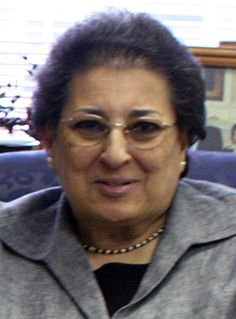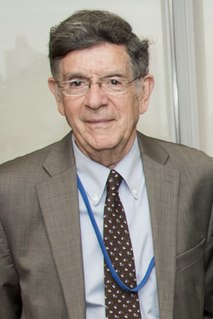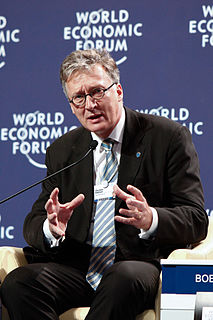
The United Nations System consists of the United Nations, and the six principal organs of the United Nations: the General Assembly, Security Council, Economic and Social Council (ECOSOC), Trusteeship Council, International Court of Justice (ICJ), and the UN Secretariat, specialized agencies, and affiliated organizations. The executive heads of some of the United Nations System organizations and the World Trade Organization, which is not formally part of the United Nations System, have seats on the United Nations System Chief Executives' Board for Coordination (CEB). This body, chaired by the Secretary-General of the United Nations, meets twice a year to co-ordinate the work of the organizations of the United Nations System.
The United Nations Development Fund for Women was established in December 1976 originally as the Voluntary Fund for the United Nations Decade for Women in the International Women's Year. Its first director was Margaret C. Snyder, Ph.D. It provides financial and technical assistance to innovative programmes and strategies that promote women’s human rights, political participation and economic security. Since 1976 it has supported women's empowerment and gender equality through its programme offices and links with women's organizations in the major regions of the world. Its work on gender responsive budgets began in 1996 in Southern Africa and has expanded to include East Africa, Southeast Asia, South Asia, Central America and the Andean region. It has worked to increase awareness throughout the UN system of gender responsive budgets as a tool to strengthen economic governance in all countries.
An Under-Secretary-General of the United Nations (USG) is a senior official within the United Nations System, normally appointed by the General Assembly on the recommendation of the Secretary-General for a renewable term of four years. Under-Secretary-General is the third highest rank in the United Nations, after the Secretary-General and the Deputy Secretary-General. The rank is held by the heads of different UN entities, certain high officials of the United Nations Secretariat, and high-level envoys. The United Nations regards the rank as equal to that of a cabinet minister of a member state, and under-secretaries-general have diplomatic immunity under the UN Charter.

Alicia Isabel Adriana Bárcena Ibarra is a Mexican biologist who currently serves as the Executive Secretary of the United Nations Economic Commission for Latin America and the Caribbean (ECLAC).
UN-Energy is an interagency mechanism within the system of the United Nations related to energy. It was created after the 2002 World Summit on Sustainable Development in Johannesburg, and its purpose is to create a coherent approach towards a sustainable energy system especially in developing countries to meet the Millennium Development Goals.

Thoraya Ahmed Obaid was the Executive Director of the United Nations Population Fund and an Under-Secretary General of the United Nations from 2000 to 2010. Obaid is from Saudi Arabia. The United Nations Population Fund is the world's largest multilateral source of population assistance. Ms Obaid was appointed to her position effective 1 January 2001, with the rank of Under-Secretary-General of the United Nations. She is the first Saudi Arabian to head a United Nations agency.

The United Nations Office for Project Services (UNOPS) is an operational arm of the United Nations, dedicated to implementing projects for the United Nations System, international financial institutions, governments and other partners around the world. The organization's global headquarters is located on the UN City campus in Copenhagen, Denmark.

Achim Steiner is an environmentalist, of Brazilian-German ancestry, who currently serves as the Administrator of the United Nations Development Programme. Before joining UNDP, he was Executive Director of the United Nations Environment Programme UNEP (2006–2016), and director of the Oxford Martin School (2016–2017). He has also served as Director General of the International Union for Conservation of Nature (IUCN) and Secretary-General of the World Commission on Dams.
A United Nations Resident Coordinator is the highest United Nations official and the chief of UN diplomatic mission in a country. It confers the same rank as an Ambassador of a foreign state. The resident coordinator is the designated representative of the UN secretary general and leader of United Nations Country Team of agencies such as UNICEF, WHO, WFP or UNFPA.

Gert Rosenthal Königsberger is a Guatemalan diplomat.

The United Nations Department of Economic and Social Affairs is part of the United Nations Secretariat and is responsible for the follow-up to major United Nations Summits and Conferences, as well as services to the United Nations Economic and Social Council and the Second and Third Committees of the United Nations General Assembly. UN DESA assists countries around the world in agenda-setting and decision-making with the goal of meeting their economic, social and environmental challenges. It supports international cooperation to promote sustainable development for all, having as a foundation the 2030 Agenda for Sustainable Development and the 17 Sustainable Development Goals (SDGs) as adopted by the UN General Assembly on 25 September 2015. In providing a broad range of analytical products, policy advice, and technical assistance, UN DESA effectively translates global commitments in the economic, social and environmental spheres into national policies and actions and continues to play a key role in monitoring progress towards internationally agreed-upon development goals. It is also a member of the United Nations Development Group.

Thomas Stelzer currently serves as the resident Ambassador of Austria in Portugal and non-resident Ambassador of Austria in Cape Verde.
The Social Protection Floor (SPF), is the first level of social protection in a national social protection system. It is a basic set of social rights derived from human right treaties, including access to essential services and social transfers, in cash or in kind, to guarantee income security, food security, adequate nutrition and access to essential services.
The Committee for the Coordination of Statistical Activities (CCSA) is composed of international and supranational organisations, whose mandate includes the provision of statistics. The CCSA promotes inter-agency coordination and cooperation on statistical programmes and consistency in statistical practices and development. As a forum of committed members, the CCSA fosters good practices in the statistical activities of international and supranational organisations, in accordance with the principles governing international statistical activities. The members of the CCSA contribute actively to the development of a coordinated global statistical system producing and disseminating high-quality statistics.
Thomas Gass is a Swiss diplomat who currently serves as Head of the South Cooperation Department of the Swiss Agency for Development and Cooperation. Until End of December 2017, he served as the United Nations Assistant Secretary-General for Policy Coordination and Inter-Agency Affairs in the Department of Economic and Social Affairs. Previous appointments included Ambassador and Head of Mission of Switzerland to Nepal (2009-2013), as well as a wide-range of experiences in bilateral and multilateral development cooperation.
The United Nations Evaluation Group (UNEG) is a platform for the different United Nations (UN) evaluation offices to discuss evaluation issues and to share evaluation knowledge. It suggests norms and standards for all evaluation offices in the UN and delivers thematic reports concerning monitoring and evaluation. It has 45 members and 3 observers listed below.










